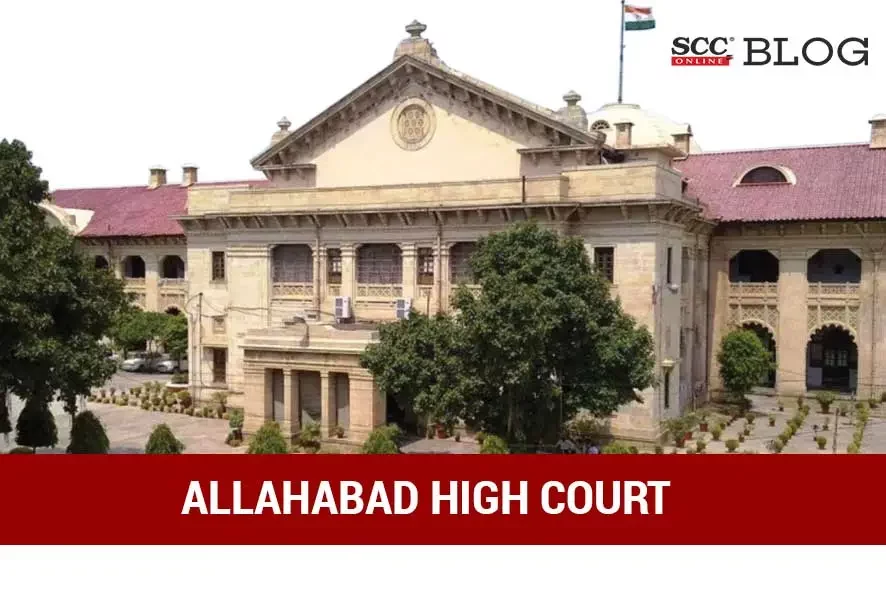Allahabad High Court: In an appeal, regarding maintainability of the instant appeal under Section 173(2) of the Motor Vehicles Act, 1988, (MVAct,1988’) in view of the report submitted by the Stamp Reporter. Dr. Yogendra Kumar Srivastava, J. held that an appeal against an award of the Claims Tribunal, even if the amount in dispute in the appeal is less than ‘one lakh rupees’ would be entertainable provided that the amount in dispute is not less than ‘ten thousand rupees’, and it relates to a claim petition filed prior to 01-04-2022. Further, it held the objection of the Stamp Reporter regarding maintainability of the appeal under Section 173(2) of M V Act, 1988, unsustainable.
The appellant pointed out that the objection of the Stamp Reporter is based on the amended provision contained under Section 173(2), in terms of which the pecuniary limit for filing of an appeal against an award of a Claims Tribunal, has been raised to ‘one lakh rupees’ from the earlier limit of ‘ten thousand rupees’.
The appellant contended that the right to file an appeal being a vested right and having accrued on the institution of the claim petition before the Tribunal, the said right cannot be taken away or curtailed by means of a subsequent amendment, particularly, when the said amendment does not have a retrospective effect.
The Court, after a comparative reading of Section 173 of the Motor Vehicles Act, 1988, pre and post amendment, said that except for substituting the amount ‘one lakh’ for the amount ‘ten thousand’, the provision remains the same as it was earlier.
After referring to various decisions, the Court said that the right of appeal is not a mere matter of procedure but a substantive right. It is a vested right which accrues to the litigant on the date the lis commences and this vested right cannot be taken away by a subsequent enactment, unless it is so provided expressly or by necessary intendment.
The Court said that the pursuit of a legal remedy, suit or appeal are steps in a series of proceedings all connected by an intrinsic unity. The institution of the suit carries with it the implication that the right of an appeal, as in force, is preserved during the progress of the proceedings. This right to enter the superior court accrues to the litigant and exists as on and from the date the lis commences, and although it may be exercised when the adverse judgment is pronounced by the first court, the vested right is to be governed by the law prevailing on the date of institution of the suit or proceeding and not by the law that prevails on the date of its decision or on the date of filing of the appeal.
The Court further said that the effect of the Amending Act of 2019, in respect of Section 173 of the Motor Vehicles Act, 1988, is to raise the pecuniary limit for filing of an appeal against an award of a Claims Tribunal, from ‘ten thousand rupees’ to ‘one lakh rupees’
It added that as the earlier law continues to exist for the purpose of supporting the pre-existing right of appeal, that law must govern the exercise and enforcement of that right of appeal and there would be no question of the amended provision preventing the exercise of that right or acting as a clog upon the right which had crystallized earlier.
The Court said that the right of appeal having been conferred by statute and, therefore, being a vested right, the effect of the amendment would have to be seen in the context as to whether it keeps alive the old rights or whether it manifests an intention to destroy them.
The Court held that the right of appeal under the unamended provision was a substantive right, and it continues to be so under the amended provision also; the only change being regarding enhancement of the pecuniary limit for filing an appeal. Thus, the effect of the amendment is not to destroy or alter the preexisting rights. Therefore, the substantive right of appeal which is in the nature of a vested right would continue to be enforced as per the pre-existing law without in any manner being affected by the Amending Act.
The Court added that in construing a statutory provision, the cardinal rule of construction is that statutes should be interpreted, in a manner, to respect vested rights. In the absence of anything in the enactment to show that it is to have retrospective operation, it cannot be construed to have the effect of altering the pre-existing law applicable to a claim in litigation.
The Court held that the Amending Act of 2019 does not take away the right of appeal, and it does not substantially alter the pre-existing provision of an appeal under Section 173; the only modification being that the pecuniary limit of filing of an appeal has been raised from ‘ten thousand rupees’ to ‘one lakh rupees’.
The Court noted that the Amending Act of 2019 which was published in the gazette was not given retrospective effect; rather in terms of Section 1 (2) of the Amending Act, its provisions were to come into force on different dates to be appointed by the Central Government, by notification in the official gazette. Thus, the legislative intent was clearly to apply the provisions of the Amending Act prospectively. Section 27 of the Amending Act, which relates to the amendment to the pecuniary limit of filing an appeal under Section 173, was also prospectively applied in terms of the notification dated 25-02-2022, which came into force w.e.f. 01-04-2022.
[Icici Lombard General Insurance Co. Ltd v. Suresh, 2024 SCC OnLine All 122]
Advocates who appeared in this case:
Counsel for Appellant : Advocate Rahul Sahai






